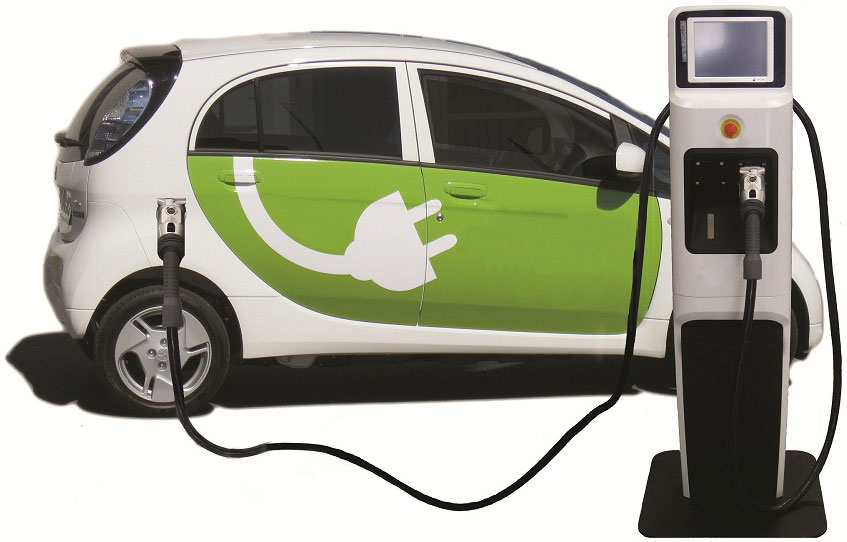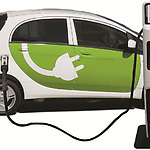Where the market share of renewable energy in the Netherlands increased to 5,8 percent in 2014 [1], this is still a very little part of the total energy production. The often great resistance against windmills near houses I read about in the newspapers makes me think how the other 94,2 percent will be located such that residents won’t be disadvantaged. However, renewable energy sources form a huge part of a successful large-scale implementation of Electric Vehicles (EVs) in the Dutch market. Why? Because using EVs and not changing our energy production won’t significantly solve the problem of global warming, it just shifts the problem from the vehicles to the electricity factories, where electricity is generated from fossil fuels (Figure 1). But I must have to admit, carbon dioxide is much better to catch at the industry level than at the vehicle-level, but this won’t be a significant difference. So driving EVs requires a sustainable energy supply. How about managing this interaction and, more important, how to make the link between a technological design (EVs) and the customer market? As you know, a technology can be that revolutionary, if you’re not able to translate this technology into market terms, your innovation is doomed to fail.
Figure. Risk of shifting the problem
Let’s start with five criteria innovation management must pass in order to be successful in the market and then apply those to the EV. The criteria are [2]:
- Great leadership
- Large customer profit
- Right timing
- Not going too fast
- Innovative mentality
No lack of innovative mentality in the case of EVs! The current electrical engines on the market are of a very high quality and in relative short time, very diverse electric vehicles were developed. Companies investing in Research & Development vary from Tesla to Google. Also few complaints about going too fast, EV companies are quite patient and keep developing EVs that have to take over the car industry. Also the guidelines set up by the Dutch government, implicating that in 2020 there have to be 200.000 EVs and in 2025 1 million EVs [3], make clear that the government understands that large scale production of this innovation requires patience and customer acclimatization. Right timing is the leader of the list: there couldn’t be a better time than now, a time in which global warming is given top priority and the supply of oil is running out.
Regarding EV-management, questions can be asked about short term customer profits and great leadership. The price of an average EV is balancing around 25000 euros [4], much more than the average price of a conventional vehicle. This is caused by the high costs of the batteries storing the electricity. Also the range of EVs, about 250 kilometres, is much less than the range of conventional vehicles around 500 kilometres [5]. On the short term, customer profitability of EVs can thus be doubted. There also seems to be a lack of leadership in the EV-industry: government is trying to leave the innovation of EVs as much as possible to the market and several companies are developing their own designs, not communicating much with each other (maybe because of competitive reasons). Tesla, BMW, Toyota, Google: all these companies are developing very diverse EVs but what I miss is a coordinating body, exchanging designs and strategies in order to steer the EV-production into a certain direction, maximizing customer profitability. About the earlier discussed profitability, on the long term EVs could be beneficial when oil prices are running out of control because of a decreasing oil supply and when the technology level is raising so that production of EVs becomes cheaper. This will be just a matter of time: EVs are much more developed than other transportation variants, like hydrogen vehicles or vehicles driving on gas, and fact is that we have to move on to other transportation types (future shortage of oil).
As I mentioned in the beginning, no Electric Vehicle without energy transition to renewable energy. A proposal for the Dutch government: what you should do, is cooperating with the other North West European countries on generating large scale renewable energy. The Netherlands is just too small to produce 100% renewable energy on their own and there is a lot of space in Germany and the Nordic countries. With the excuse that we are also taking Norwegian prisoners into our country.
Sources
[2] https://www.managementsite.nl/innoveren-innovatie-blunders
[5] http://www.wagenplan.nl/wagenparkbeheerder/elektrisch-rijden/algemene-informatie



